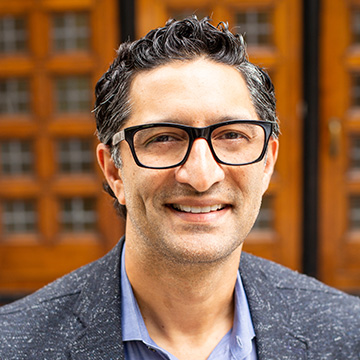There are few departments across the United States based in medical schools that contain such a vibrant mix of social scientists as MSS"
Division Chief, Intervention Science

The Division of Intervention Science aims to:
- Create a supportive, collaborative and safe environment that leverages our collective expertise in intervention research.
- Inspire rigorous and impactful intervention science.
- Equitably improve psychological and physical health in our served communities
- Foster innovation in social and intervention sciences.
Research Programs & Labs
Positive Psychology & Health Investigation Group (PPHIG) Studying positive emotion's effects on mental and physical health
Studying positive emotion's effects on mental and physical health
Traditionally stress and coping research has focused on the (very natural and often adaptive) negative emotions that occur in the context of stress: anxiety, sadness and depressive mood. However, our work shows that even in the context of life stress such as serious illness or death of a loved one, positive emotions can and do occur, and have unique coping correlates and adaptive consequences. For example, among people living with HIV/AIDS or diabetes, positive emotion is associated with lower risk of mortality, controlling for negative emotion, and other predictors of mortality.
For more information, see Moskowitz's faculty profile or the PPHIG website.
Lab for Scalable Mental Health Scalable interventions to reduce mental health problems
For more information see Schleider's faculty profile or the Lab for Scalable Mental Health website.
Flourishing in Society and Health (FISH) Research Lab Promoting health through mindfulness, connection and nature
Promoting health through mindfulness, connection and nature
The FISH lab is dedicated to better understanding the role of flourishing on human health, the health of our society and the health of our planet, including how flourishing can be more than an outcome, but also a learned skill and positive health behavior that may be experienced, practiced, and maintained throughout our lives. Much of our work focuses on supporting people affected by chronic medical conditions such as cancer and their caregivers.
For more information see Victorson's faculty profile or the Flourishing in Health website.
Supportive Oncology Program Support services for oncology patients
Support services for oncology patients
The Supportive Oncology Program of the Robert H. Lurie Comprehensive Cancer Center of Northwestern University provides supportive services for oncology patients through faculty and staff psychologists, social workers, dietitians, tobacco treatment specialists, fertility preservation navigators, adolescent and young adult oncology navigators, massage therapists and acupuncturists.
Research that has involved faculty in our program includes research on quality of life and cancer, symptom measurement in cancer, and helping patients maintain healthy diet and exercise habits during and after cancer treatment.
For more information see Pearman's faculty profile, the Supportive Oncology Team, or Patient Support.
Mothers and Babies Lab Preventing perinatal depression
Preventing perinatal depression
The particular intervention that is the focus of most of our work is Mothers and Babies (MB)—an intervention deemed by the United States Preventive Services Task Force as one of the two most effective interventions for preventing perinatal depression. In addition to our projects funded by federal and philanthropic sources, we also conduct work aimed at scaling/replicating MB across the United States.
We are currently conducting several research studies aimed at examining the impact of MB, including its potential impact on maternal mental health, parenting, and child self-regulation. Another current focus is adapting MB to reach specific perinatal populations more equitably (e.g., sexual and gender minorities, tribal/indigenous families, individuals experience perinatal trauma). Much of our intervention research takes place in the context of home visiting and early childhood programs, and we are also conducting studies that focus on other health topics (e.g., cardiovascular health) delivered via home visiting programs. A major focus of our intervention research is understanding the delivery of MB by lay health professionals.
For more information see Tandon's faculty profile or the Mothers and Babies Program website.